
“Most retailers consist of four walls in a building, creating an environment that forces consumers to come to them,” explained Pano Anthos, founder and managing director of YRC Labs, and among the presenters at this week’s New York Dealmaking Session, sponsored by the International Council of Shopping Centers. “That is not good enough anymore. Consider what I saw today after riding to the convention center after picking up my bicycle at Citi Bike. There were vendors selling mittens and gloves along my entire route, because it was bitter cold outside. And, they were moving product. If it were raining, you would have seen umbrella entrepreneurs everywhere. They understand what it takes to make a sale and, that is, retailers need to aggressively find its customers.”
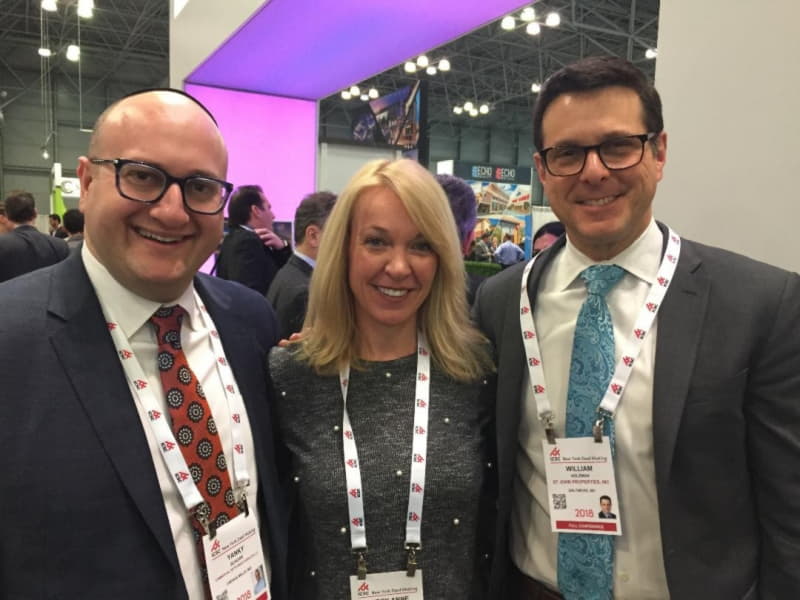
Yanky Schorr and Terry Anne Hearn, Commercial Settlement Services with Bill Holzman, St. John Properties
To survive in a rapidly changing retail world, retailers better figure these things out. And fast. That was the overarching theme at the various seminars held at the Jacob K. Javits Convention Center, where an estimated 10,000 developers, retailers, brokers and affiliated professionals gathered for three days to initiate or conclude lease transactions, network and experience the latest products and technology serving the retail industry. Since moving to this location from mid-town Manhattan several years ago, the showroom floor has the look and energy of ICSC’s largest convention held annually in Las Vegas each spring.
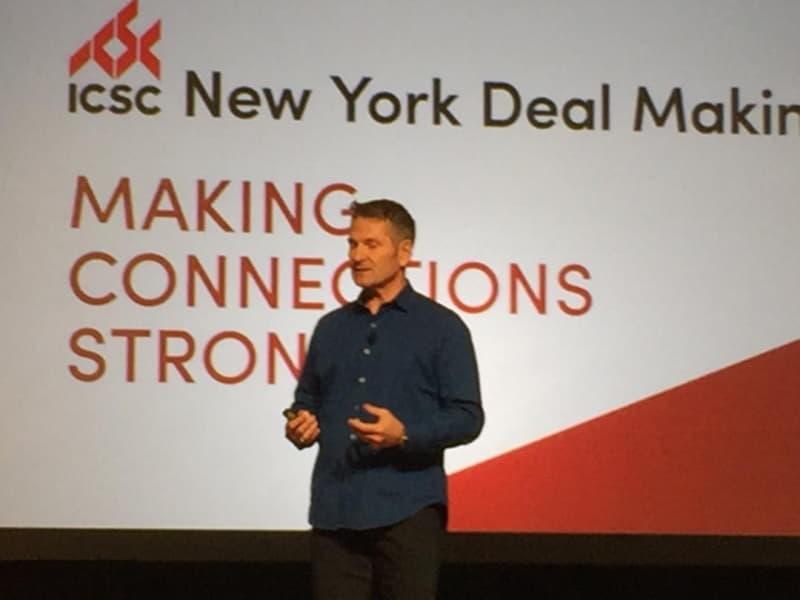
Doug Stephens, Founder, Retail Prophet
“What is more important to you,” Anthos polled the audience, “time or money? “We already know the answer, because you can’t reclaim time. So, consumers cannot be bothered by wasting their time in a retail environment that they consider boring. Instead, it must be engaging and I don’t mean with a large Ferris wheel outside. Approximately 20% of all retail space in the New York City area is vacant. It is essential for retailers to create an aura of product scarcity, and to make the transaction process simple and even fun.”
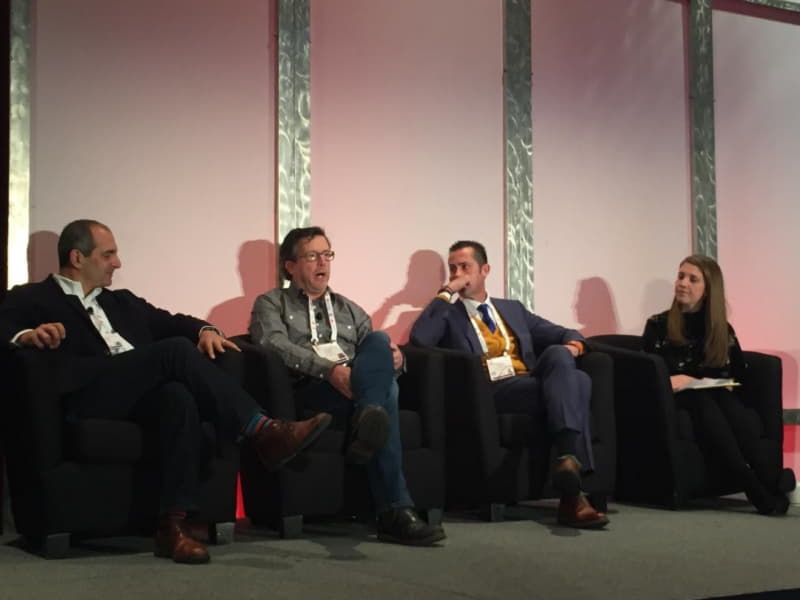
Pano Anthos, YRC Labs; Kevin Mackenzie, Broad Box; Sever Garcia, SGN Group and Lauren Thomas, CNBC
“Retailers that have operated their stores one way for the past twenty five years need to completely re-think their ways,” stated Sever Garcia, CEO of SGN Group and founder of HiO. “Consumers are guiding retailers on the way they want to shop in the future and this includes acting on demand. Shopping centers are like eco-systems and the same people visit time and time again. This needs rethinking in the future.”
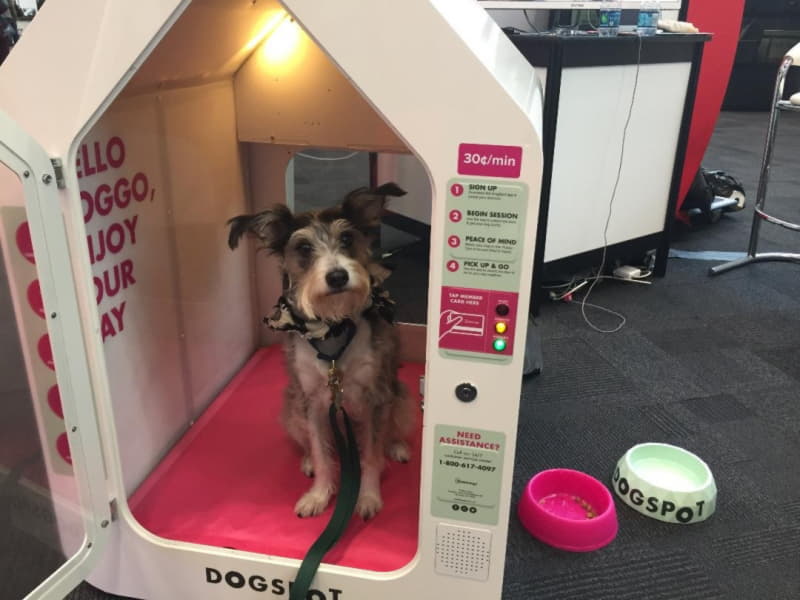
Dogspot
Featured luncheon speaker Doug Stephens, founder of consultancy firm Retail Prophet and a recognized author on the retail industry started off with a cheery holiday thought by relating the fact that 8,642 stores have closed thus far this year. And, year-to-year spending in the United States for on-line shopping has increased by 21%. By the year 2022, the amount of traffic and transactions completed on smartphones will increase by a factor of ten. “I am not telling you something you don’t know,” Stephens told the audience, “and there is still a place for shopping centers and malls, but retailers need to figure out their purpose and roles in society moving forward.”
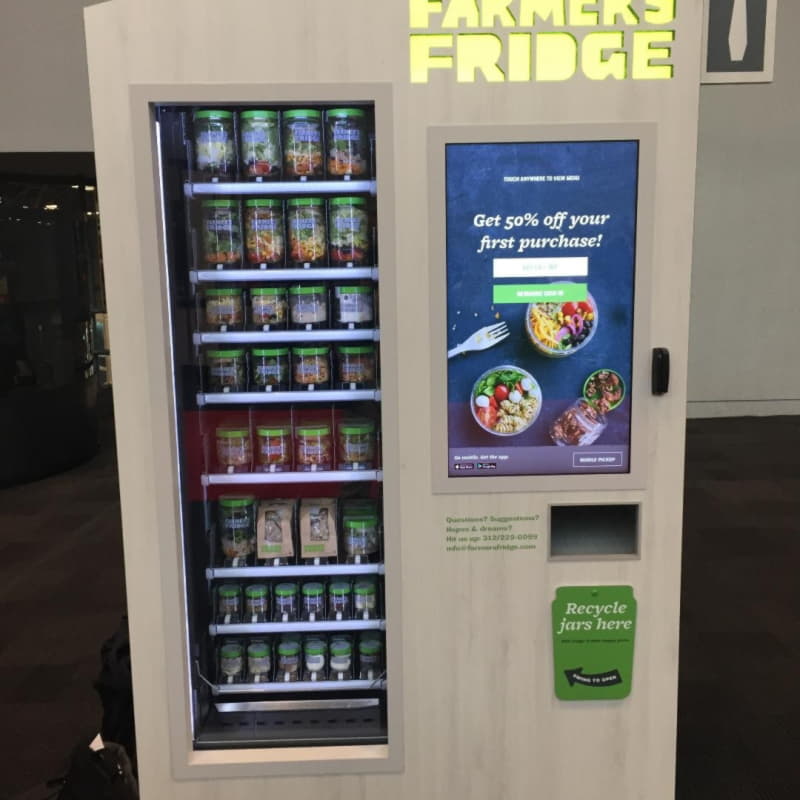
Farmer's Fridge
Stephens rattled off the increasing size of Amazon’s fleet of jets and delivery trucks utilized to move product, while also adding that Amazon now owns a prefabrication home builder and has revolutionized the way packages are delivered with lockers and the ability to place items in the trunk of a consumer’s car. “You would think that logistics companies are growing concerned and would be circling the wagons to protect their turf. So now, I am going to play an interview conducted with Fred Smith, CEO of FedEx.
“Let me be clear about definitions,” Smith began. “Amazon is a retailer. FedEx is a transportation company.” End of interview. The audience roared. Which company is thinking and reacting progressively and which one is sitting back on its laurels? This is a lesson for all retailers if not all companies and business people.
“Wal-Mart - yes Wal-Mart - is rethinking its mammoth store footprints and reconfiguring them into life-style centers,” Stephens explained. “Nordstrom is building 3000 square foot stores in which consumers can try merchandise on, but it is shipped to them following the purchase. And, look what Starbucks did by inventing its own language when describing a coffee drink. Consumers loved that. In the future, your home may be equipped with a mini-store that has sensors to detect when you exhaust the supply of products. Then, technology will automatically reorder it with delivery made to your house. Your washing machine and water filtering device will do the same when they run out of detergent or supplies.
“What is the best advice I can impart to shopping center owners,” he asked. “Make sure the environment contains stores or places that are selfie-worthy,” he added. “It is all about creating memories and experiences.”
News and notes:
ICSC President and CEO Tom McKee explained that the baby-boomer generation is transitioning out of their prime purchasing period of their lives, but millennials, with the oldest members of this group now turning 37, are now entering. “This is the time in a person’s life where the high ticket items are consumed and bodes well for the economy and the retail industry in general,” he said.
Not all retailers are shrinking their bricks-and-mortar footprint, with UNTUCKit bucking the trend, McKee said. “With five stores in 2016 and 25 in 2017, they expect to have more than 100 stores operating by the year 2022.”
Chelsea Brownridge, founder of Dogspot, demonstrated the “dog parking” concept she is rolling out around the country, with more than 60 units now operating in stated. “Dogspot is positioned outside areas where dogs are not allowed such as grocery stores, certain restaurants and the post office,” she explained. “Pet owners can monitor their best friend via the puppy-cam and the cost is about 30 cents per minute.”
“When cafes close, consumers can still enjoy healthy food alternatives including salads and bowls,” said Raleigh Garson of Farmer’s Fridge a concept that is now present in more than 200 locations, primarily healthcare and educational institutions and airports.”
Larry Lichtenauer, President and Founder of Lawrence Howard & Associates, Inc., a full-service public relations and marketing firm, reports on ICSC conventions three times annually. He can be reached at Larry@lawrencehoward.com















